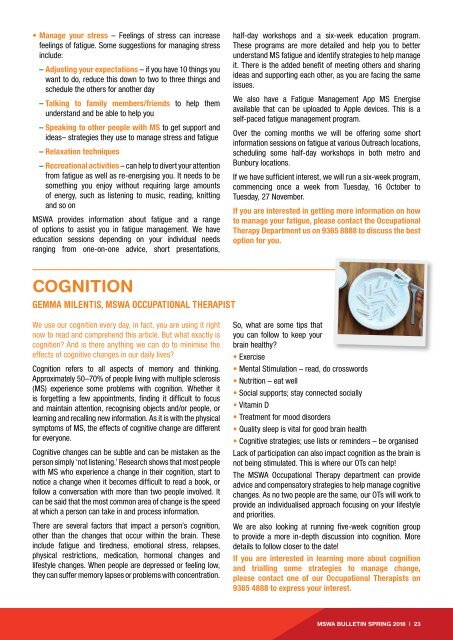You also want an ePaper? Increase the reach of your titles
YUMPU automatically turns print PDFs into web optimized ePapers that Google loves.
• Manage your stress – Feelings of stress can increase<br />
feelings of fatigue. Some suggestions for managing stress<br />
include:<br />
– Adjusting your expectations – if you have 10 things you<br />
want to do, reduce this down to two to three things and<br />
schedule the others for another day<br />
– Talking to family members/friends to help them<br />
understand and be able to help you<br />
– Speaking to other people with MS to get support and<br />
ideas– strategies they use to manage stress and fatigue<br />
– Relaxation techniques<br />
– Recreational activities – can help to divert your attention<br />
from fatigue as well as re-energising you. It needs to be<br />
something you enjoy without requiring large amounts<br />
of energy, such as listening to music, reading, knitting<br />
and so on<br />
MSWA provides information about fatigue and a range<br />
of options to assist you in fatigue management. We have<br />
education sessions depending on your individual needs<br />
ranging from one-on-one advice, short presentations,<br />
half-day workshops and a six-week education program.<br />
These programs are more detailed and help you to better<br />
understand MS fatigue and identify strategies to help manage<br />
it. There is the added benefit of meeting others and sharing<br />
ideas and supporting each other, as you are facing the same<br />
issues.<br />
We also have a Fatigue Management App MS Energise<br />
available that can be uploaded to Apple devices. This is a<br />
self-paced fatigue management program.<br />
Over the coming months we will be offering some short<br />
information sessions on fatigue at various Outreach locations,<br />
scheduling some half-day workshops in both metro and<br />
Bunbury locations.<br />
If we have sufficient interest, we will run a six-week program,<br />
commencing once a week from Tuesday, 16 October to<br />
Tuesday, 27 November.<br />
If you are interested in getting more information on how<br />
to manage your fatigue, please contact the Occupational<br />
Therapy Department us on 9365 8888 to discuss the best<br />
option for you.<br />
COGNITION<br />
GEMMA MILENTIS, MSWA OCCUPATIONAL THERAPIST<br />
We use our cognition every day, in fact, you are using it right<br />
now to read and comprehend this article. But what exactly is<br />
cognition? And is there anything we can do to minimise the<br />
effects of cognitive changes in our daily lives?<br />
Cognition refers to all aspects of memory and thinking.<br />
Approximately 50–70% of people living with multiple sclerosis<br />
(MS) experience some problems with cognition. Whether it<br />
is forgetting a few appointments, finding it difficult to focus<br />
and maintain attention, recognising objects and/or people, or<br />
learning and recalling new information. As it is with the physical<br />
symptoms of MS, the effects of cognitive change are different<br />
for everyone.<br />
Cognitive changes can be subtle and can be mistaken as the<br />
person simply ‘not listening.’ Research shows that most people<br />
with MS who experience a change in their cognition, start to<br />
notice a change when it becomes difficult to read a book, or<br />
follow a conversation with more than two people involved. It<br />
can be said that the most common area of change is the speed<br />
at which a person can take in and process information.<br />
There are several factors that impact a person’s cognition,<br />
other than the changes that occur within the brain. These<br />
include fatigue and tiredness, emotional stress, relapses,<br />
physical restrictions, medication, hormonal changes and<br />
lifestyle changes. When people are depressed or feeling low,<br />
they can suffer memory lapses or problems with concentration.<br />
So, what are some tips that<br />
you can follow to keep your<br />
brain healthy?<br />
• Exercise<br />
• Mental Stimulation – read, do crosswords<br />
• Nutrition – eat well<br />
• Social supports; stay connected socially<br />
• Vitamin D<br />
• Treatment for mood disorders<br />
• Quality sleep is vital for good brain health<br />
• Cognitive strategies; use lists or reminders – be organised<br />
Lack of participation can also impact cognition as the brain is<br />
not being stimulated. This is where our OTs can help!<br />
The MSWA Occupational Therapy department can provide<br />
advice and compensatory strategies to help manage cognitive<br />
changes. As no two people are the same, our OTs will work to<br />
provide an individualised approach focusing on your lifestyle<br />
and priorities.<br />
We are also looking at running five-week cognition group<br />
to provide a more in-depth discussion into cognition. More<br />
details to follow closer to the date!<br />
If you are interested in learning more about cognition<br />
and trialling some strategies to manage change,<br />
please contact one of our Occupational Therapists on<br />
9365 4888 to express your interest.<br />
MSWA BULLETIN SPRING <strong>2018</strong> | 23


















